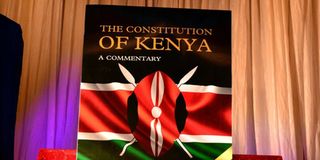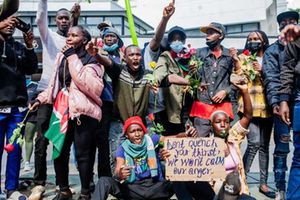
The 2010 constitution of Kenya.
Winston Churchill, the British statesman, once opined that “democracy is the worst form of government, except for all others.”
Of all the systems of government known to humans, democracy is the only one with the potential to yield the largest political space for freedom and liberty, provide bountiful economic opportunity for individual citizens, and guarantee a modicum of popular sovereignty and stability.
But remember that democracy has many structural and procedural iterations and permutations. Democracies can often be illiberal bucking the very normative foundations of the system. Above all, democracy is a form of learned system which must infuse the blood stream of a people to be culturally viable. In my view, this is why Kenya’s democracy is under siege.
Kenyans are toddlers in the milieu of democracy. Both the language of democracy and its diction are not native to Kenya’s tongue. We must admit that the system is an import, or even imposition, of the West on Africa.
Before you start gagging and bloviating that I have become an autocrat, allow me to peel your eyes. For those who have an appetite for more extended theories and philosophical postulates, I urge you to read my scholarly works, which are ample.
My point is that even in the West, where political democracy as we know it today germinated, there are still serious attempts at reversal. You need look no further than the United States to validate this statement.
Democratic failures
Relative to the United States, or Europe, Africa is a baby in terms of the practice of the norms and rhythms of democracy. That’s why we need to go a little easy on democratic failures in Africa. That doesn’t mean everything goes. But it means that when citizens see a gaping hole in democratic practice, they are entitled to demand – loudly – that ruling elites correct the error of their ways.
It means that civil society – the cartilage between the state and the people and which prevents the tyranny of the former over the latter – has a gargantuan task to police the middle. It also means that one of the roles of civil society apart from oversight over the state, is the education of both the state and the people to drum into both the mores and traditions of democracy.
When I say that Kenya’s democracy is under siege, I am not actually talking about the current Gen Z restlessness. No – I am concerned about deeper phenomena. I am afraid that the 2010 Constitution, which is largely a copycat of the American and South African constitutions, is not well understood by Kenyans.
Contrary to common opinion, the 2010 Constitution wasn’t imposed on the elite by Wanjiku. On the contrary, Kenya’s liberal elites – responding to the age of tyranny under the Daniel Moi-KANU State, imposed the 2010 Constitution on both Wanjiku and the conservative factions of Kenya’s elites. In fact, only the liberal elites, led largely by civil society and the political opposition, understood the 2010 constitution. Both Wanjiku and Kenya’s conservatives are yet to internalize the 2010 national charter.
Gen Z protesters
In my view, the Gen Z protesters understand Kenya’s constitution the least among our educated classes. Most have never seen or read it. But they instinctively know something is wrong because in their lived experiences the three arms of government are behaving badly, in a manner of speaking. Their distaste for government is instinctive, not intellectual.
In this case, instinct in my view is superior to intellect. That’s because government legitimacy rests not on how many theories it can get right, but on whether it’s carrying the people along in its governance. If the people instinctively in their lived experiences feel a huge trust gap between themselves and the state, then the illegitimacy of the state deepens. This takes me back to the basic predicates of liberalism.
A liberal political democracy works not because it’s perfect or flawless. No – all political democracies have high levels of dysfunction. The difference between failing democracies and robust ones can be measured in how deep and wide the norms and practices of democracy are ingrained not just in the elites but in the common people.
This is where the 2010 Constitution comes in. Most of our elites in and out of government and our hoi polloi have an understanding of the 2010 constitution that is a mile long and an inch deep. Which means they are largely ignorant of the document that governs them. The brains of Kenyans are yet to catch up the noble aspirations of the 2010 Constitution.
The primary responsibility of the State and ruling elites is to make sure that Kenyans instinctively and intellectually drink from the rich cup of the 2010 Constitution. We must reduce the large deficit between the black letter law of the 2010 Constitution and its instinctual understanding by the people. Kenyans must begin to feel the construction in their bones.
Makau Mutua is SUNY Distinguished Professor and Margaret W. Wong Professor at Buffalo Law School, The State University of New York. He’s Senior Advisor on Constitutional Affairs to President William Ruto. On X: @makaumutua.








